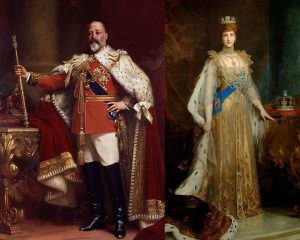Finest Hour 184
The Uncrowned King: Edward VIII
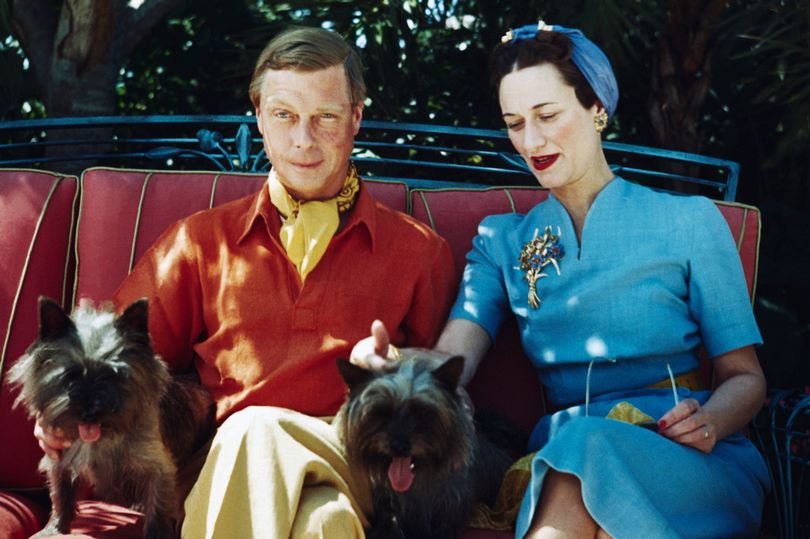
The Duke and Duchess of Windsor with their dogs
July 24, 2019
Finest Hour 184, Second Quarter 2019
Page 21
By David Freeman
David Freeman is editor of Finest Hour. This article originally appeared in the winter 2011 issue of The Churchillian. It has been revised and updated.
Born 23 June 1894, Prince Edward Albert Christian George Andrew Patrick David immediately occupied a position of near-inconceivable stature. British influence in the world and the British Empire stood at their zenith. As the eldest great-grandchild of Queen Victoria in the direct-male line, the Prince (known to his family as David) stood to inherit what Winston Churchill later described to him as “the finest Throne in the world.”1 Forty-two years later, the Prince who became King Edward VIII freely chose to give up that throne in order to marry the woman he loved.
The only voluntary abdication by a British monarch since the Anglo-Saxon age deeply involved Churchill and has become incrusted with rumors and misperceptions that were born at the time and have been repeated ever since. With most (but still not all) of the records now open, fact can be separated from fiction to show how Churchill and the King understood, related to, and indeed used—or tried to use—one another.
Early Encounters
The lives of the young Prince and Churchill, twenty years his senior, first intersected in 1911, when King George V made his eldest son the Prince of Wales. As Home Secretary it fell to Churchill to read out the Letters Patent that invested the Prince with his new title during the ceremony at Caernarvon Castle. Predictably, Churchill found this a moving occasion, and thought “the little Prince looked & spoke as well as it was possible for anyone to do,” noting in a letter to Clementine that “he was a very nice boy—quite simply & terribly kept in order.”2
When Churchill became First Lord of the Admiralty shortly after the investiture, he became a hero to the newly-installed Prince of Wales, who had been a naval cadet. Churchill’s vigorous emphasis on sea power appealed to the Prince, who wrote of the First Lord: “He is a wonderful man and has a great power of work.”3 For his part Churchill confirmed the promotion of the Prince to Lieutenant in 1913. While staying at Balmoral that summer, Churchill had a long talk with the Prince as they went through the First Lord’s official Admiralty dispatch boxes together.
Writing to Clementine, Churchill indicated that he and the Prince “have made rather friends,” and noted with avuncular concern the nineteen-year-old’s self-imposed Spartan lifestyle. “He requires to fall in love with a pretty cat.” Churchill concluded of the Prince with a reference to Clementine’s pet name, “who will prevent him from getting too strenuous.”4 Little could Churchill imagine the resulting repercussions when the Prince finally did fall in love.
The First World War temporarily strained the relationship. Despite his naval training, the Prince was commissioned in the army and sent to France, only to be shielded at General Headquarters well behind the front lines. Anxious to do his bit in combat, a frustrated Prince thanked Churchill early in the war for expressing sympathy for his situation. Very soon, though, the impressionable Prince absorbed the dismissive contempt held by the battlefield “hard hats” for the “top hats” in London, including Churchill. By 1915, with Churchill under fire for the struggling Dardanelles campaign, the Prince was describing the First Lord as an “interfering politician” and “intriguing swine” who was “nothing short of a national danger.”5
When David Lloyd George became Prime Minister in 1916, the Prince expressed satisfaction that Churchill was not initially included in the new Government. When Churchill was appointed Minister of Munitions in 1917, the Prince wrote, “I suppose he has silently wormed his way in again,” but allowed that it was perhaps “safer to give him a job than to have him hanging around unemployed.”6
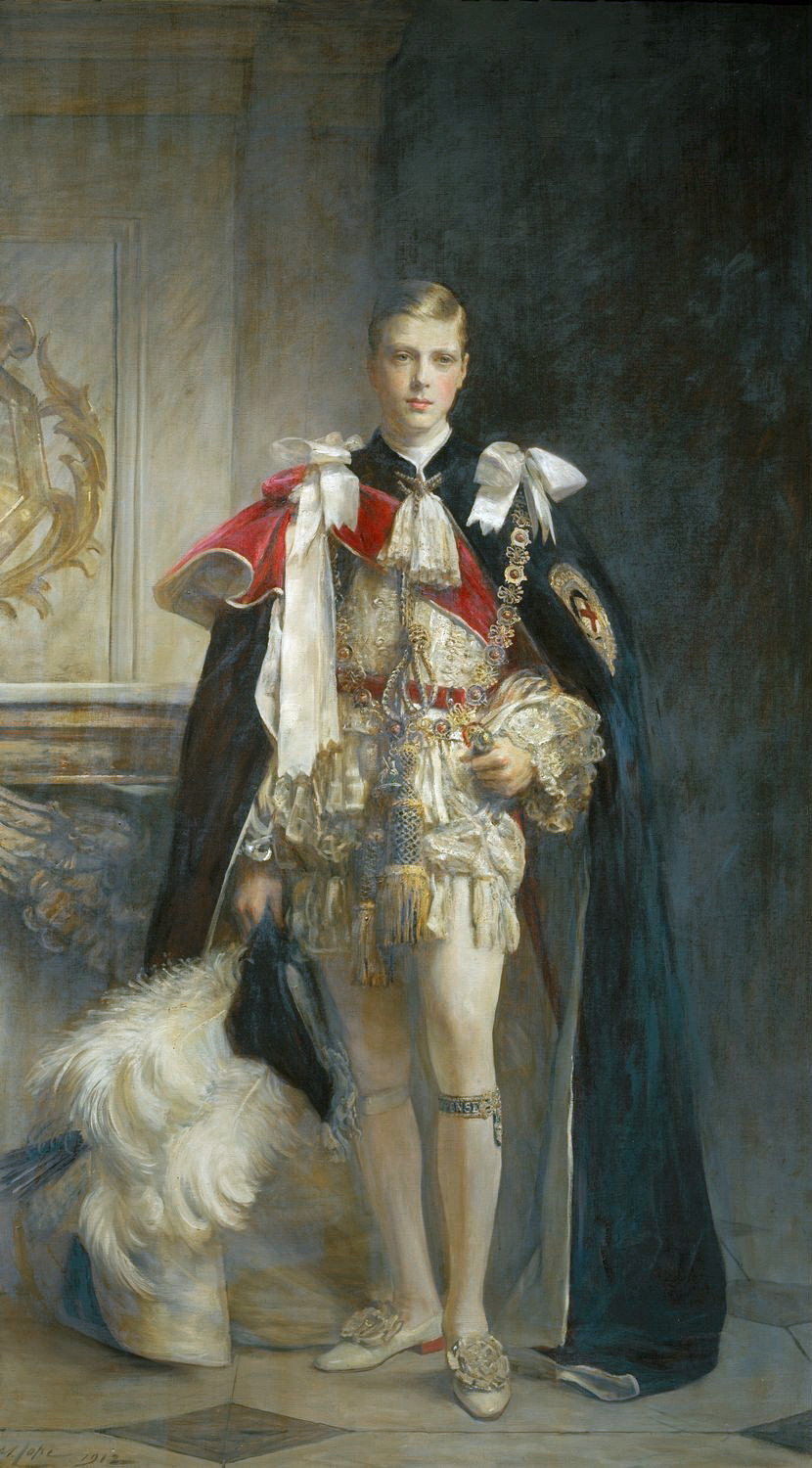
Bachelor Prince
The sophomoric attitude of the maturing Prince did not survive the war. By the summer of 1919, he was twenty-five and starting to take up a full slate of royal duties. He happily accepted public speaking advice from Churchill, who was pleased to accommodate him. Do not be ashamed to read a speech, Churchill advised, but in that case, “do it quite openly, reading it very slowly and deliberately.”7
As Prince, as King, and later as Duke of Windsor, Edward occasionally sought Churchill’s assistance in preparing important speeches—including his Abdication broadcast in 1936. This has long been known. Less well known is that in 1928 the Prince of Wales started seeing a speech therapist, who had also treated and been recommended to him by Churchill.
Cortland MacMahon served as Instructor for Speech Defects and Breathing Exercises at St. Bartholomew’s Hospital from 1911 to 1939. Churchill believed that he personally benefited from MacMahon’s treatment “to the extent almost of a perfect cure” and felt it his “duty to spread the good tidings to others who may be similarly helped.”8 In February 1928, MacMahon wrote Churchill that he had commenced treatment of HRH the Prince of Wales and thanked Churchill for the reference.
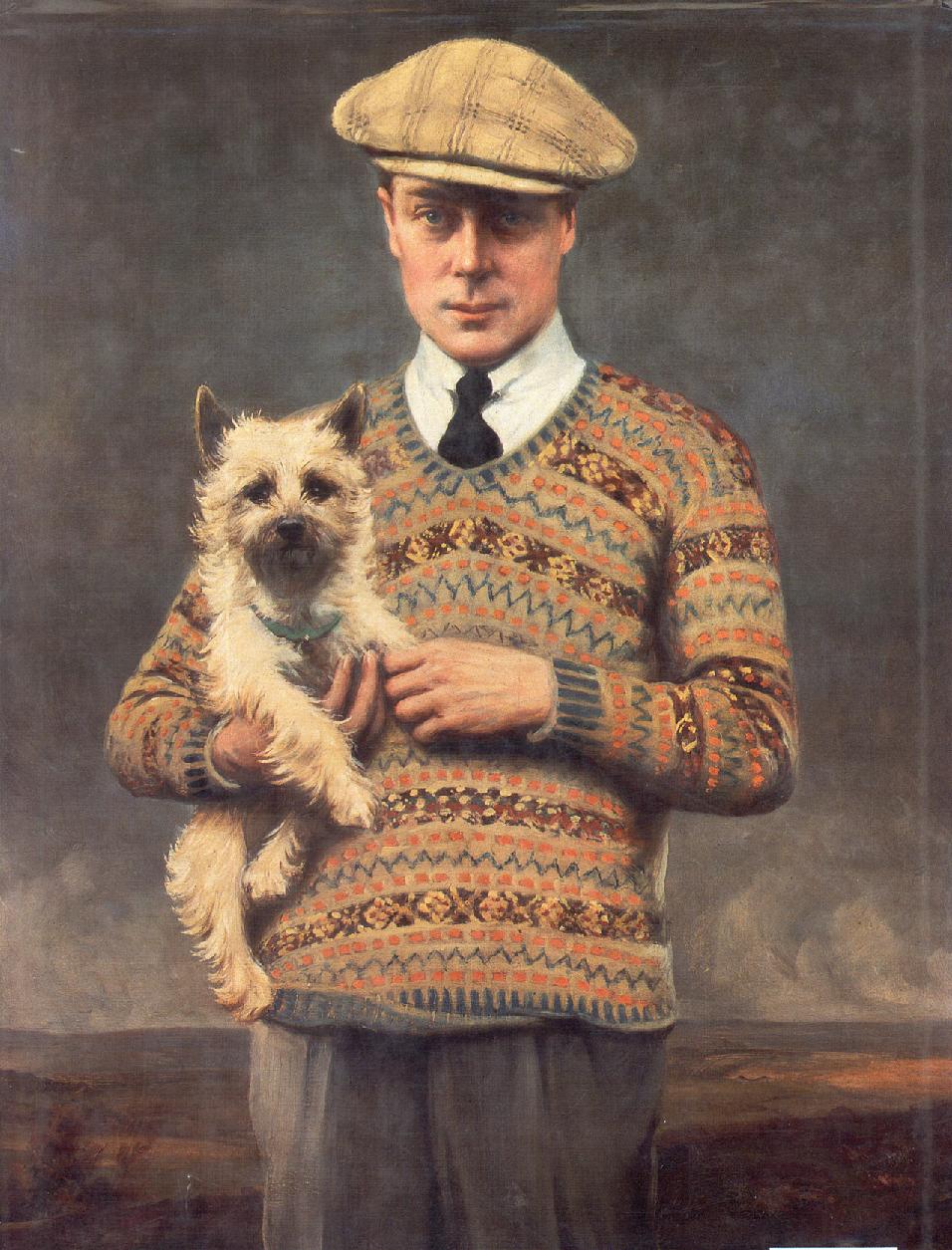
If Edward truly suffered from a speech impediment, his problem did not begin to compare with that of his younger brother the Duke of York, who had recently started seeing his own therapist, Lionel Logue—a story now made famous by the Oscar-winning film The King’s Speech. In fact, Churchill’s recommendation of MacMahon probably mattered very little with the Prince of Wales, who most likely started treatment as a result of his infatuation with another of MacMahon’s patients, Mrs. Freda Dudley Ward.
To understand Churchill’s behavior during the Abdication Crisis and his views about Mrs. Simpson, it must be understood that Churchill, along with the rest of British high society, had a front-row seat to the Prince of Wales’s first extended relationship with a married woman. The Prince met Mrs. Dudley Ward in 1918. By 1921 Churchill was writing in a chatty letter to Clementine that he had attended “a jolly little dance at Freda’s” at which “the little Prince” was “idolizing as usual.” Churchill wrote: “People are getting quite bored with it. They think a door should be open or shut.”9 More than six years later, though, Churchill was hosting the Prince and his mistress to luncheon. “It was quite pathetic to see,” Churchill wrote Clementine. “His love is so obvious and undistinguishable.”10 Nevertheless, the Prince did abandon Mrs. Dudley Ward after a long and passionate relationship. Observers like Churchill, therefore, might reasonably suppose that the Prince might well leave his next married paramour. This fatally flawed assumption tripped up Churchill’s political acumen during the final weeks of Edward VIII’s reign.
Mrs. Simpson
Churchill was not alone in misapprehending until too late the Prince’s feeling about the American woman who supplanted Freda Dudley Ward in his affections. Wallis Warfield Simpson may have been married with one divorce behind her already, but Churchill had served as a minister to the Prince’s grandfather, the philandering King Edward VII and took a “modern” view toward royal mistresses.
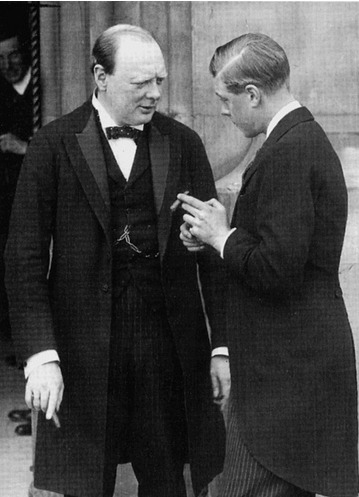
Only after Edward VIII had acceded to the throne upon the death of his father in January 1936 did Churchill begin to receive intimations that the new King’s relationship with Mrs. Simpson was very serious. “Extraordinary as it may seem,” Edwards VIII’’s official biographer Philip Ziegler wrote of the King, “all the evidence suggests that even Mrs. Simpson was given no inkling of his real wishes until his reign was some way advanced.”11
In July 1936 Churchill was sounded out by the new King’s close adviser Walter Monckton as to whether Mrs. Simpson might divorce her second husband and then spend the summer with the King at Balmoral. Churchill strongly opposed both proposals. He learned later that these unwelcome views convinced Mrs. Simpson that Churchill was “against her.”12 Certainly Churchill was not consulted again by the King until the following December, when Edward’s abandonment of the throne was all but decided.
Abdication
On 16 November 1936 the King informed Prime Minister Stanley Baldwin of his intention to marry Mrs. Simpson, who had just been granted by a court the first step toward a final divorce. Baldwin recognized immediately that no such marriage would be acceptable in that day and age. On 25 November Baldwin met with Opposition leaders along with Churchill (then a backbencher but also a senior Privy Councilor), telling them that should the King insist on marriage the government would resign. The Labour and Liberal leaders, Clement Attlee and Archibald Sinclair, assured Baldwin that they would support the decision and refuse to form a government. According to Neville Chamberlain, who was also present, Churchill said “that although his attitude was ‘a little difficult,’ he too ‘would certainly support the Government.’”13
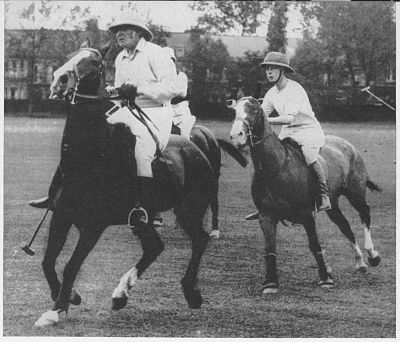
Just where did Churchill stand? Essentially he opposed any marriage between the King and Mrs. Simpson. He felt a natural sympathy for the King, however, and believed that the solution was a morganatic marriage. Under this plan, Mrs. Simpson would become the Duchess of Cornwall but not Queen. The Cabinet, however, did not approve; neither did the Dominions. Churchill’s only hope then became that the King would see reason, accept his duty as Sovereign, and give up Mrs. Simpson. To this end, Churchill began pressing for time—which put him out of step with most of the nation.
Churchill’s friend J. A. Spender wrote to him in shock on 6 December: “How can you suggest that the present state of things should be prolonged for five months…. the thing ought to be settled at once.”14 Another colleague, Leo Amery, correctly perceived that “the country as a whole was getting progressively more shocked at the idea that the King could hesitate between his duty to the Throne and his affection for a woman.”15
Nevertheless, Churchill persevered and, pressing in the House of Commons for the King to be given more time, found himself shouted down by members of both parties on Monday, 7 December. This almost unprecedented Parliamentary rebuke chilled Churchill, who stormed out of the chamber, his rising prospects as a proponent of rearmament against Germany momentarily (but not permanently) derailed.
Misperceptions
Many wild rumors have floated about then and now. One is that Churchill wanted to form a minority Government with a “King’s Party” that would force a general election and divide the nation over the King’s personal life. Former Prime Minister Ramsay MacDonald thought “a person like Churchill might well put his hand to that job!”16 But this notion is disproven in letters Churchill wrote the day before the abdication.
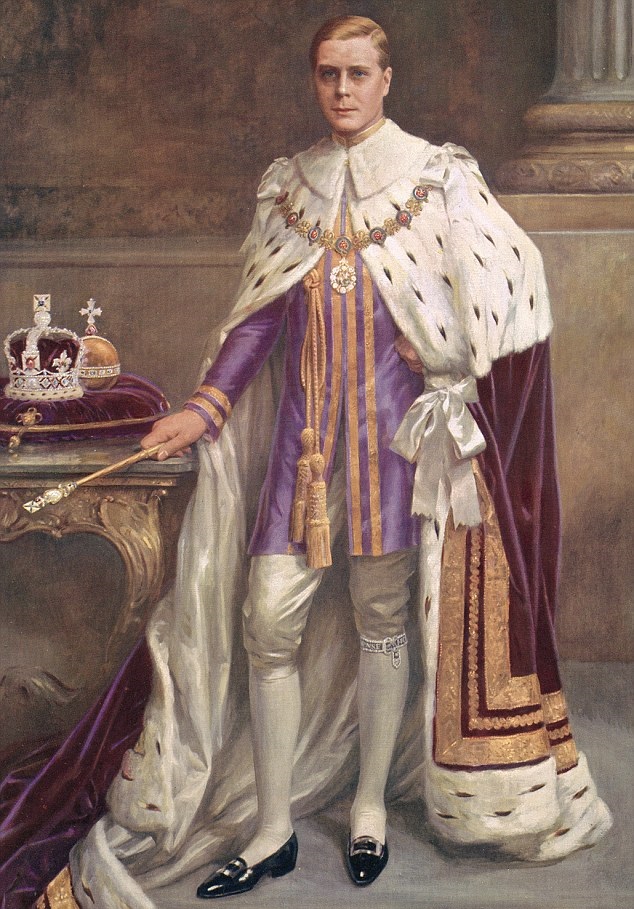
In reply to Spender on 9 December, Churchill wrote: “I have never thought of such a thing as five months raging propaganda, but I have asked for ten days or a fortnight.”17 That same day Churchill also wrote: “My main difference with the Government has consisted in the fact that I regarded abdication as a far greater disaster than they did, and I would have put up with the disadvantages and dangers of a prolongation of the controversy within moderate time limits.”18
In the view of the royal courtier Sir Alan Lascelles, Churchill’s apparent misreading of the King during the crisis and his sentimental loyalty to the same man as Duke of Windsor was “based on a tragic false premise—viz that he (Winston) really knew the D of W, which he never did.”19 Lascelles had served the Prince of Wales as Assistant Private Secretary throughout the 1920s before holding the same position with every monarch from George V through Elizabeth II. From his daily contact with Edward VIII, Lascelles could see what Churchill could not: a man not completely devoted to duty.
Baldwin knew this as well. During his regular contact with Edward VIII throughout the brief reign, the Prime Minister learned that the King was dangerously careless with secret state documents and less than diligent at discharging his duties. Unlike Churchill, who was out of contact with the King for most of the reign, Baldwin understood early that the King would not give up Mrs. Simpson. From these facts the Prime Minister concluded reasonably that the nation would be better off with a change of monarchs. There was no reason, however, why Baldwin should share this information with Churchill, his arch-critic; if Churchill embarrassed himself as a result, so much the better.
For his part Churchill had often met the Prince of Wales socially and professionally. To the end of his days, Churchill sent signed copies of his many books to the Prince/King/Duke, who almost certainly never read any of them. “Dear Winston, Thank you for your book, I have put it on the shelf with the others,” he once responded.20 Like most, Churchill had originally expected the immensely popular Prince to become an equally popular King and had tremendous difficulty coming to terms with events.
Did Churchill’s missteps with Edward VIII, as Lascelles believed, result from perceiving a strong intimacy where none existed? Evidence indicates otherwise. Trade union leader Sir Walter Citrine had lunch with Churchill on 2 December 1936 and remembered that Churchill spoke about the crisis growing around the King before finally remarking quietly: “I will defend him. I think it is my duty.” “‘What?’ I said. ‘Irrespective of what he has done?’” “Winston looked grave, and putting his hands on his breast, he said with emotion, ‘He feels it here….’”21
The Facts of the Matter
Believing his King to be in duress awoke in Churchill powerful emotions of sympathy and stirred his sense of chivalry. These feelings rather than the notion that he truly understood the King are what blinded Churchill to the wider scope of the crisis.
Unlike Baldwin, Churchill had not been in close touch with the King during his brief time on the throne. He did not see that the King would never give up marrying Mrs. Simpson no matter how much time he was afforded and would willingly accept abdication as the price. Churchill was pressing for time that the King did not need. But Churchill’s larger failing was his inability to perceive, as Spender and Amery did, that the public spectacle of a sovereign pondering his duty was far more damaging to the monarchy than abdication. By the following year, however, Churchill “had the honesty to admit” that “when he stood up in favour of the ex-King, he did not know that public opinion was so much against him.”22
While Churchill’s personal and political antennae failed him during the abdication crisis, it is also a myth that his actions hampered his campaign to alert the nation to the rising danger of Hitler. At an anti-Nazi rally at the Royal Albert Hall one week before Edward VIII finally gave up his throne, Churchill had to be dissuaded by Sir Walter Citrine, who was presiding, from making a statement about the King. Nevertheless, Citrine recorded, “the meeting passed off successfully without the least vestige of discord….Winston read his speech throughout in the most masterly fashion.”23 No lasting damage to the fight against Appeasement resulted from Churchill’s support for Edward VIII.
“I earnestly hope it may be possible to
destroy all traces of these German intrigues.”
–Churchill, 1945
Duke in Exile
After abdicating on 10 December, Edward was created Duke of Windsor and went to the continent to await finalization of Mrs. Simpson’s divorce so that he could marry her at last. Writing to his former sovereign, Churchill remarked: “The line I take is ‘I wish to see the [new] King reign gloriously, and the Duke of Windsor live happily.’”24 As a senior Privy Councilor and member of the Civil List Committee, Churchill attempted to assist in the politically delicate matter of providing an adequate financial settlement for the Duke. Once again, though, Churchill found himself tripped up by the maladroitness of the man he so devotedly served.
The Duke had misled his brother, the newly-crowned King George VI, about the state of his finances and extracted a promise of support that proved wholly unnecessary. As this gradually but inevitably became apparent to the new King, fraternal relations became permanently strained. Churchill unwittingly exacerbated the situation with occasional efforts to see to it that the Duke and his Duchess would one day be allowed to take up permanent residence in Britain. Churchill believed that several years would have to pass before this could happen, but encouraged the Duke in this regard. King George VI, though, understood that as a former monarch, the Duke could never live in Britain: “We know this, so does Winston,” he recorded, “but we can never tell my brother in so many words. He has got to realize if for himself.”25
As it happened, the Duke unwittingly provided just the prescription needed to keep himself in permanent exile. After their marriage, the former Mrs. Simpson became Duchess of Windsor but was not accorded royal status. This upset the Duke to the point that he refused to return home until his wife received what he believed she had attained through right of marriage. Churchill opposed a royal title for the Duchess and believed no “Government will be found in England which would advise the Crown to take such a step.”26 Still, it took many years for the slow-witted Duke to absorb the truth.
The King over the Water
Living in France when the Second World War began in 1939, the Windsors were initially evacuated to England via a destroyer provided by Churchill himself, then newly re-installed as First Lord of the Admiralty. They soon returned to France, however, he to take up a commission as a Major General and military observer, she to involve herself with relief work. When German forces broke through in the spring of 1940, the Windsors were forced to evacuate again, first to Spain and then to Portugal. German intrigues began to swell around the couple in Madrid and Lisbon.
Having become Prime Minister during his nation’s greatest hour of peril, Churchill repeatedly had his attention irritatingly distracted from the Battle of Britain by the need to move the Windsors out of harm’s way and the foolish attempts by the Duke to set terms under the circumstances. At the end of July, the Duke was dispatched to the Bahamas to take up the duties of Governor with strict instructions from Churchill not to say anything that could be construed as defeatist.
Safely deposited in Nassau, the Duke quickly set about stretching Churchill’s patience to the breaking point. First he wanted £5,000 to renovate the dilapidated Government House. “Comment is needless,” Churchill scribbled on the request.27 Meeting President Roosevelt off the island of Eleuthera at the end of 1940, the Duke voiced doubts about achieving victory, repeating these sentiments in an American magazine in 1941. Churchill responded with a rebuke restrained only by the civility that the Prime Minister’s abiding respect for the royal family can explain. Anne Sebba, however, reports in her biography of the Duchess of Windsor that “there are known to be letters kept secret at the request of the royal family,” which reveal Churchill’s “anger and frustration with the Duke, exacerbated by the ex-King offering unsolicited advice about the prosecution of the war.”28
After the German invasion of the Soviet Union in June 1941, the Duke adopted a more robust outlook on the war. Permitted to take leave that summer to visit Canada and the United States, he requested advice from Churchill about what to say on his tour. The Prime Minister responded at length, and the Duke appears to have followed the advice. Lord Halifax, the British Ambassador in Washington, reported that President Roosevelt was greatly impressed by the Duke’s substantially changed attitude.
Last Years
After the war, the Windsors returned to France and gradually came to the realization that their exile was permanent. Out of office himself, Churchill quickly let bygones be bygones and resumed his friendship with the former King. He continued to lobby for an ambassadorial post for the Duke and blamed the Labour Government for not supporting this, although he should have known that George VI would not have taken kindly to the proposal. More happily the Windsors hosted the Churchill’s fortieth wedding anniversary celebration in 1948.
As official historians of the war culled through German archives captured by the Americans, material potentially embarrassing to the Duke was discovered in connection with his time in Spain and Portugal in 1940. Alerted to this by Prime Minister Attlee in 1945, Churchill responded, “I earnestly hope it may be possible to destroy all traces of these German intrigues.”29
It was another eight years before the papers were in a state for possible publication. By then Churchill was back in Downing Street. Since the material had been shared by the Allied powers, Churchill wrote in vain to President Eisenhower urging him to suppress the documents. Thwarted in his efforts to eradicate a portion of the historical record, Churchill adopted a resigned attitude. “The American historians are bringing out some beastly documents,” he wrote to Clementine, “but they will do no harm and I expect it is only put in to add some sensationalism to what would otherwise be a boring book.”30
Much has been made of the so-called “German dossier” about the Duke—and most of it is nonsense. Churchill and the Duke both adopted the view that it was much ado about nothing. Ziegler persuasively argues that the Germans misread the perpetually self-centered Duke to a far greater extent than Churchill ever did.
We Change Our Kings
In January 1939 with war brewing, Churchill attended a dinner hosted by the Windsors at their home in France. Desperately anxious to avoid war, the Duke had supported the recent Munich Agreement, which had not yet been violated by Germany, and did not understand Churchill’s adamant opposition to the settlement. Present that evening was an American journalist, Vincent Sheean, who recorded the following after-dinner scene:
The Duke of Windsor and Mr. Churchill settled down to a prolonged argument with the rest of the party listening in silence. The Duke had read Mr. Churchill’s recent articles on Spain and his newest one (out that day, I believe) in which he appealed for an alliance with Soviet Russia.
We sat by the fireplace, Mr. Churchill frowning with intentness at the floor in front of him, mincing no words, reminding HRH of the British constitution on occasion—“When our Kings are in conflict with our constitution, we change our Kings,” he said—and declaring flatly that the nation stood in the gravest danger in its long history. The kilted Duke in his Stewart [sic] tartan sat on the edge of the sofa, eagerly interrupting whenever he could, contesting every point, but receiving—in terms of the utmost politeness so far as the words went—an object lesson in political wisdom and public spirit. The rest of us sat fixed in silence; there was something dramatically final, irrevocable about this dispute.31
An abiding respect for monarchy and a sympathetic nature towards friends in need always guided Churchill’s conduct towards the Duke, even at political risk to himself. But outweighing any personal loyalties Churchill possessed was his even deeper regard for the British constitution and his willingness to defend it at all costs. If there had been no Mrs. Simpson and no abdication, if Edward VIII had still been on the throne when war arrived, the King would have found himself served by the greatest Prime Minister any British monarch ever had the privilege to know.
Endnotes
1. Churchill (WSC) to the Duke of Windsor, 17 November 1939, in Martin Gilbert, ed., The Churchill War Papers, Vol. I, At the Admiralty, 1939–1940 (Boston: Houghton Mifflin, 1993), p. 378.
2. WSC to Mrs. Churchill (CSC), 13 July 1911, in Mary Soames, ed., Winston and Clementine: The Personal Letters of the Churchills (Boston: Houghton Mifflin, 1999), p. 54, and WSC to CSC, 14 July 1911, in Randolph Churchill, ed., Winston S. Churchill, Companion Volume II, Part 2, 1907–1911(Boston: Houghton Mifflin, 1969), p. 1099.
3. Philip Ziegler, King Edward VIII (London: Collins, 1990), p. 46.
4. WSC to CSC, 20 September 1913, Companion II, p. 1781.
5. Ziegler, p. 59.
6. Ibid., p. 78.
7. Ibid., p. 112.
8. WSC to MacMahon, 21 March 1927, in Martin Gilbert, ed., Companion Volume V, Part 1, The Exchequer Years, 1922–1929 (Boston: Houghton Mifflin, 1981), p. 969.
9. WSC to CSC, 16 February 1921, in Martin Gilbert, ed., Winston S. Churchill, Companion Volume IV, Part 2, 1919– 1921 (Boston: Houghton Mifflin, 1978), p. 1355.
10. WSC to CSC, 22 October 1927, Companion V, Part 1, p. 1068.
11. Ziegler, p. 227.
12. “The Abdication of King Edward VIII,” private memorandum by WSC, December 1936, in Martin Gilbert, ed., Winston S. Churchill, Companion Volume V, Part 3, The Coming of War, 1936–1939 (Boston: Houghton Mifflin, 1983), p. 452.
13. Quoted in Martin Gilbert, Winston S. Churchill, Vol. V, The Prophet of Truth, 1922–1939 (Boston: Houghton Mifflin, 1977), p. 812.
14. Spender to WSC, 6 December 1936, Companion V, Part 3, p. 462.
15. Amery diary, 7 December 1936, in ibid., p. 464.
16. Ziegler, p. 302.
17. WSC to Spender, 9 December 1936, Companion V, Part 3, p. 473.
18. WSC to Lord Salisbury, 9 December 1936, in ibid., p. 477.
19. Ziegler, p. 488.
20. Sarah Churchill, A Thread in the Tapestry (New York: Dodd, Mead, 1966), p. 41.
21. Gilbert, Prophet of Truth, p. 813.
22. G. D. Birla to Mahadeo Desai, 16 August 1937, in Companion V, Part 3, p. 747.
23. Lord Citrine recollections, 3 December 1936, in ibid., p. 450.
24. WSC to the Duke of Windsor, 17 May 1937, in ibid., p. 672.
25. Ziegler, p. 469.
26. WSC note of remarks to Lord Wigram, 25 April 1937, in Companion V, Part 3, p. 653.
27. Ziegler, p. 443.
28. Anne Sebba, That Woman: The Life of Wallis Simpson (London: Weidenfeld and Nicholson, 2011), p. 253.
29. Ziegler, p. 549.
30. WSC to CSC, 25 May 1954, in Martin Gilbert, Winston S. Churchill, Volume VIII, Never Despair, 1945–1965 (Boston: Houghton Mifflin, 1988), p. 979.
31. Vincent Sheehan: recollections, 19 January 1939, in Companion Volume V, Part 3, pp. 1349–50.
Subscribe
WANT MORE?
Get the Churchill Bulletin delivered to your inbox once a month.

